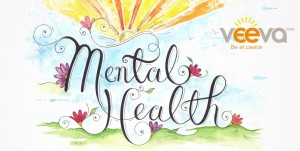
Worry Too Much About What People Think Of You?
4 Signs You May Have Social Anxiety Disorder 
This article is shared with permission from our friends at Veeva, a natural supplement company in Canada dedicated to mental health. The original article can be found at veeva.ca
All around the world there are work functions, singles meet-ups, and other events occurring right now. And as many people as there are out enjoying themselves, there is a second group of people choosing to avoid these social situations at all costs.
What this second group is suffering from you may already have guessed: social anxiety disorder (also commonly referred to as social phobia).
This disorder if not diagnosed properly, and treated, may lead to an increased likelihood of depression, loneliness, and even drug and alcohol abuse
What is social anxiety disorder?
Some assume that social anxiety disorder (SAD) is simply a form of nervousness experienced in public, and while this is a part of it, social anxiety is actually characterized by the fear of evaluation the sufferer experiences either before or after a social interaction.
An example of this may be a teenager anticipating the social consequences of putting his or her hand up and answering a question in class. Or, someone who may stress about their coworkers’ reactions if they were to outshine them.
Experts have identified that social anxiety can range anywhere from shyness to a full blown life altering disorder and the severity varies from person to person.
What are the symptoms of social anxiety disorder and how is it different from generalized anxiety?
In the fifth edition of the Diagnostic and Statistical Manual of Mental Disorder (1), both social anxiety and generalized anxiety (2) are together in the same diagnostic category, but this doesn’t mean they don’t have their own distinct signs and symptoms.
What are the common symptoms?
SAD and GAD both share the common thread of perceived threat being much lower than the anxiety being experienced. Both experience physical symptoms, and catastrophizing mental thoughts, and both may even occur at the same time.
What are the differences?
The differences between SAD and GAD fall within three categories:
- Thinking – Both social and general anxiety sufferers experience thought patterns that impact their ability to maintain healthy relationships, perform basic duties, and fulfil their professional obligations. People with GAD rarely suffer from fear of evaluation type thoughts which is the biggest sign of SAD. Instead, GAD sufferers mostly have worrying thoughts pertaining to their close relationships, work, finances.
- Behaviour – Avoidance is a common behavioural trait shared by those with SAD and GAD. It’s the reasoning behind this avoidance that differentiates the two. For example while a teenager with GAD may fake illness on the day of an oral presentation at school due to being unprepared, a teenager in a similar situation may fake illness rather because of the fear of being evaluated by their speech or ideas.
- Development issues – GAD is often only realized at a later age (about 30), while SAD can show up around the age of 13 or earlier. Those with SAD often experience heightened symptoms in their teenage years, as social situations increase, while those with GAD often have an increase in their symptoms as they enter adulthood due to more obligations and responsibilities.
What are the symptoms of Social Anxiety Disorder?
As is the case with all psychological problems, everyone with social anxiety experiences varying symptoms.
These symptoms include:
- Fear of using their hands in public
- Being very self-conscious
- Unable to maintain a job or relationship
- Unable to eat or drink in front of others, blushing, sweating, etc.
To test for social anxiety, many turn to the Liebowitz Social Anxiety Scale (3).
What are some good tips to help overcome social anxiety?
Cognitive-behavioural therapy (4) has shown promise in the treatment of social anxiety, but that’s not the only way to help oneself.
- Seek help from a professional – for those who really feel like their SAD is simply overwhelming them, speaking to a therapist or medical professional can help to get them back on track
- Eat a balanced diet – diets filled with sugar, processed foods, caffeine and alcohol can affect one’s brain chemistry and increase symptoms of social anxiety
- Confide in a trusted friend/family member – SAD is often a very solitary condition, but talking to a confidant could help with making sense of the feelings associated with social anxiety
- Try an herbal supplement – broaching the topic of medicine with a doctor can be a scary thought, but there is another option. An herbal supplement can go a long way in managing social anxiety. Veeva Anxiety Formula can reduce nervousness, promote relaxation and strengthen resistance to mental stress in social situations.
- Work with strengths – overcoming social anxiety can start with what one loves. For example instead of jumping into a support group or attending an acting class, someone with SAD who loves reading may find joy and comfort in joining a book club


